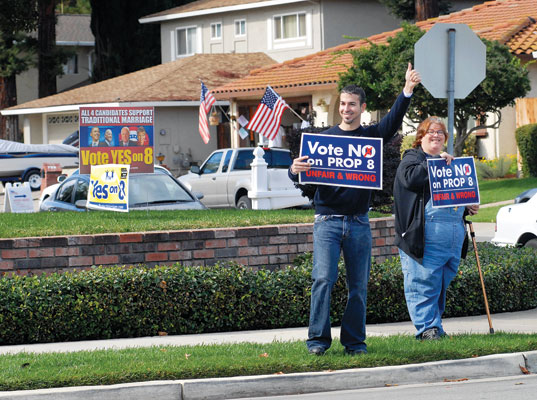
The debate over same-sex marriage dominated the list of ballot
initiatives faced by California voters, but several others featured
multimillion dollar campaigns and would have long-lasting
consequences for state taxpayers.
By NOAKI SCHWARTZ
Associated Press Writer
LOS ANGELES The debate over same-sex marriage dominated the list of ballot initiatives faced by California voters, but several others featured multimillion dollar campaigns and would have long-lasting consequences for state taxpayers.
Writing a ban on gay marriage into the state Constitution sparked the most controversy, with proponents saying religious liberty and the building blocks of society were at stake. Opponents cast Proposition 8 as a civil rights battle, testing the American ideals of equality and personal freedom.
The outcome was being watched closely around the country, especially as polls indicated the vote would be close. Early returns showed the measure passing by 53 percent.
Proposition 4 was the other divisive social issue among the 12 ballot initiatives. It would require doctors to notify parents or guardians when minors seek an abortion. California voters defeated similar initiatives twice before, in 2005 and 2006, and appeared to be defeating the measure again.
With 41 percent of precincts reporting, the ballot measure was trailing – with 52 percent against it and 48 percent in favor of it.
Other initiatives asked voters to decide questions about alternative energy, crime, agriculture conditions, public transportation and gerrymandered political districts.
Two alternative energy initiatives drew opposition from an unlikely source – environmental groups that said both created more problems than they solved.
Proposition 7, which would have required California utilities to generate half their electricity from renewable sources by 2025, was defeated with two-thirds of voters rejecting the measure with 19 percent of ballots tallied.
Another energy measure, Proposition 10, would give Californians who buy alternative-fuel vehicles up to $50,000 in rebates through a $5 billion bond measure. The measure was funded almost entirely by Texas oilman T. Boone Pickens, who founded a natural gas refueling company that would stand to benefit financially if voters approved it – but voters appeared to be rejecting the initiative.
Voters, however, appeared to be in support of Gov. Arnold Schwarzenegger’s effort to remove the Legislature’s power to draw state Assembly, Senate and Board of Equalization districts. Proposition 11 would give that authority to a 14-member, bipartisan commission.
Proposition 2, the Standards for Confining Farm Animals Act, passed. With 46 percent of the vote tallied, 62.5 percent of voters supported the measure.
The measure drew some high-profile backers, including Ellen DeGeneres and wife Portia de Rossi. The initiative sought to outlaw cramped cages for egg-laying chickens, but opponents said it would drive egg producers out of state if approved.
Two initiatives vowed to get tough on criminals while another sought to expand drug treatment programs.
Proposition 5 would prevent drug offenders from being sent back to prison for parole violations unless they commit a new felony or are considered high risk, while Proposition 6 called for a greater crackdown on gang crime. Both measures failed.
Proposition 9, meanwhile, tried to get crime victims’ rights written into the state Constitution.
Several other initiatives called for billions in bond money. Proposition 1a called for raising nearly $10 billion for building the first phase of a statewide high-speed rail system, while Proposition 3 sought to tap the state’s budget for $980 million to fix and equip children’s hospitals. With 46 percent of the precincts counted, both appeared to have a narrow lead.
Proposition 12, which would continue a state-run home loan program for veterans, passed.









